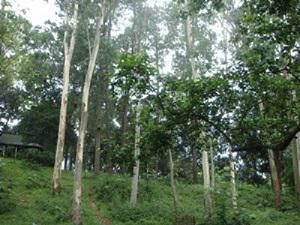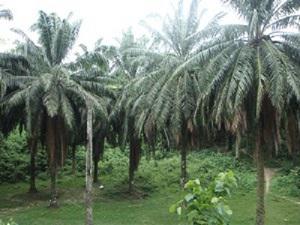Mohammad Belal Uddin
Other projects
9 Feb 2010
Effects of Land Use Changes and Anthropogenic Disturbances on Biodiversity in a Protected Area of Bangladesh
The aim of my project is to analyse the effects of monoculture plantations on biodiversity and rural livelihoods in and around protected areas of Bangladesh.
In the last few decades, it has been highlighted in various field of research (e.g. ecology, environmental sciences, biogeography) and practice (agriculture, forestry, natural resource management, nature conservation) that the conversion of natural, semi-natural, and secondary forest ecosystems into monoculture plantations throughout the world represents a serious threat to the conservation of these ecosystems. Simultaneously, they are also affecting the diverse essential goods and services provided by these ecosystems, and consequently the human well-being.

Monoplantation by Eucalyptus in study area.
These monoplantations by certain mono species as well as by notorious alien species is considered as anthropogenic and nature induced disturbances for global biodiversity, climate change and human well-being. They are considered as the most important components of human-induced global environmental change and have been placed as the central focusing critical issue and serious threat regarding the conservation of our native biodiversity in many of the world’s ecosystems. They alter ecosystem properties and processes which consequently causes adverse effect on biodiversity and global climate change. Global changes due to these monoculture plantations are more significant and long-term than other elements of climate change. There is also strong evidence that monoplantations contribute substantially to extinction. Simultaneously, they affect economists’ ambitions e.g. economic growth, poverty alleviation, and food security through large detrimental impacts on human enterprises such as fisheries, agriculture, grazing and forestry.

Monoplantation by Oil Palm in one of the other protected areas.
Bangladesh, like many other countries have a long history of monoplantation practices specially with plants from different geographic regions of the world. Since last few decades, many monoculture plantations have been raised in Bangladesh. However, the negative impacts of these monoplantations on biodiversity conservation as well as their potential impacts on rural livelihoods and well-being is less studied. The aim of my study is to analyse the effects of monoculture plantations on biodiversity and human well-being, with a focus on the effects on rural livelihoods within a general livelihoods analysis approach in and around the protected areas of Bangladesh.
This role of monoplantations on rural livelihoods and biodiversity which will be documented and expected from the project will help forest and natural resource managers to formulate proper strategies to conserve forests and their biodiversity while ensuring sustainable resource base for the poor people's livelihoods. It will help forest managers, planners and policy makers to design a biodiversity and natural resource conservation plan which will minimize the pressure on forests; optimize biodiversity and nature conservation; finally improve the rural livelihoods through ensuring people needs.